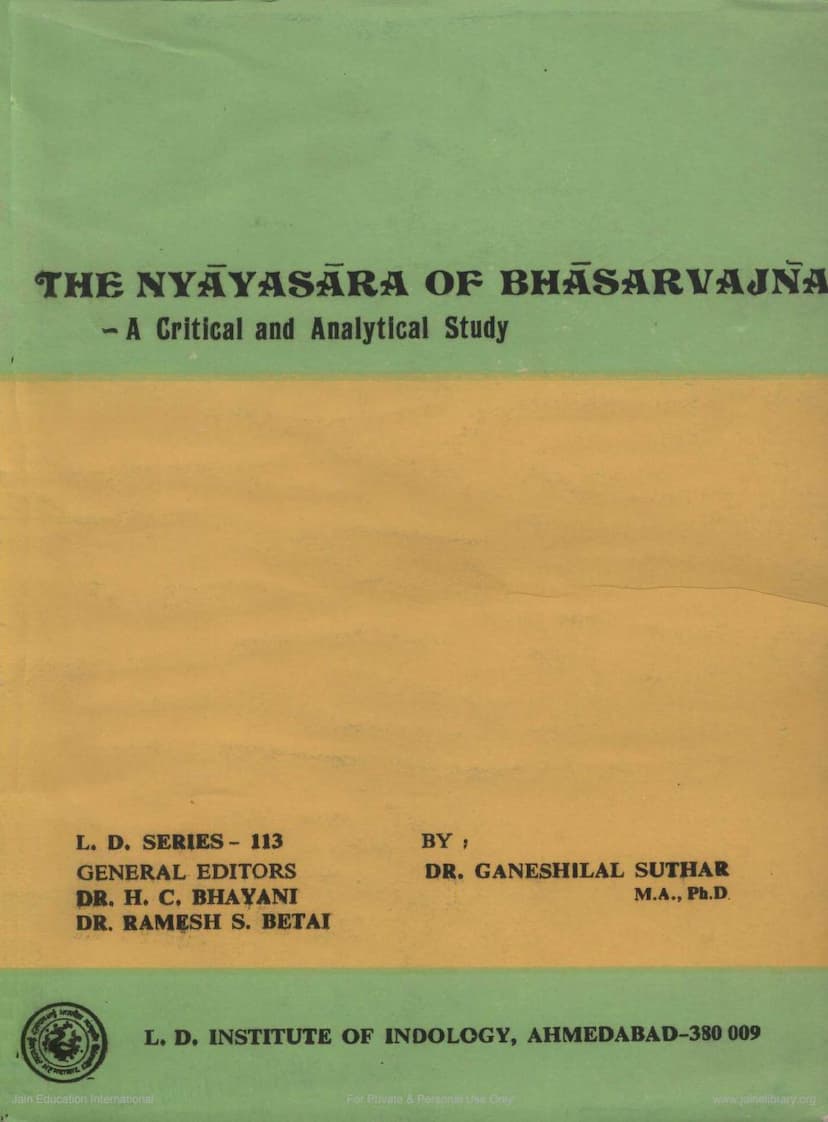Bhasarvagnya Ke Nyayasara Ka Samalochantmaka Adhyayana
Added to library: September 1, 2025

Summary
This book, "Bhasarvagnya ke Nyayasara ka Samalochantmaka Adhyayana" by Dr. Ganeshilal Suthar, published by L. D. Indology, Ahmedabad, is a critical and analytical study of the Nyayasara of Bhāsarvajña. Bhāsarvajña is presented as a foremost authority on Nyāya philosophy, known for his profound insights and simple yet deep style. The book is a compilation of Dr. Suthar's Ph.D. thesis.
The study is divided into nine critical discussions:
- Introduction: This section provides an overview of Acharya Bhāsarvajña, covering his name, geographical origin, time period, his relationship with other prominent philosophers like Jayanta Bhatta and Vācaspati Miśra, his intellectual lineage, personality, and a brief introduction to his work, particularly the Nyāyasāra and Nyāyabhūṣaṇa.
- General Characteristics of Pramāṇa: This chapter delves into the definition of Pramāṇa (means of valid knowledge) and discusses concepts like doubt (saṃśaya) and illusion (viparyaya). It also examines the inclusion of 'ūha' (inference) and 'anadhyavasāya' (non-determination) within doubt, and the doctrines of pramāṇasamplava (overlapping of valid means) and pramāṇavyavasthā (determination of valid means).
- Pramāṇa of Perception (Pratyakṣa): This section focuses on Bhāsarvajña's definition of perception, the etymological meaning and application of the term 'pratyakṣa', the distinction between nirvikalpaka (indeterminate) and savikalpaka (determinate) perception, the inclusion of Ārṣajñāna (intuitive knowledge) in yogic perception, the logical validity of samavāya (inherence) as a basis for perception, and the perception of substances and other categories.
- Pramāṇa of Inference (Anumāna): This chapter analyzes Bhāsarvajña's views on the sutra-based definition of inference and discusses the nature of Vyāpti (invariable concomitance), methods of acquiring it, the types of inference, the five members of an inference (pratijñādi), and the fallacies of the example (dṛṣṭāntābhāsa) and the probans (hetvābhāsa), highlighting Bhāsarvajña's unique contributions.
- Discussion on Debate, Deception (Chala), Fallacies (Jāti), and Points of Defeat (Nigrahasthāna): This part explores the nature of debate (vāda), contention (jalpa), and destructive argument (vitaṇḍā), along with the analysis of various forms of deception (chala), logical fallacies (jāti), and points of defeat (nigrahasthāna).
- Pramāṇa of Testimony (Āgama): This chapter deals with the definition and types of Agama (testimony) and refutes the independent validity of Upamāna (analogy) by integrating it within other pramāṇas, according to Bhāsarvajña's perspective.
- Discussion on Prameya (Objects of Knowledge): This section defines the specific characteristics of the objects of knowledge (prameya) and briefly outlines the twelve prameyas. It also presents Bhāsarvajña's categorization of prameyas into four types and discusses the concept of the soul (ātman).
- Discussion on Liberation (Apavarga): This chapter expounds Bhāsarvajña's concept of liberation (apavarga) and offers a critical review of his views.
- Influence of Bhāsarvajña on Later Scholars: The final chapter analyzes the impact of Bhāsarvajña's philosophical ideas on subsequent thinkers and works in Indian philosophy.
The foreword expresses happiness in presenting this critical study, acknowledging Bhāsarvajña's mastery and the depth of his work. The preface by Dr. Suthar outlines his personal journey into the study of Nyāya-Vaiśeṣika, his selection of Bhāsarvajña's Nyāyasāra as a research topic, and the structure of his dissertation, emphasizing the need for such a study, especially after the publication of 'Nyāyabhūṣaṇa'. The book includes a detailed table of contents, a list of abbreviations for key texts, and an extensive bibliography.
The study appears to be a thorough and scholarly examination of Bhāsarvajña's significant contribution to the Nyāya tradition, exploring his philosophical arguments, definitions, and classifications in detail.